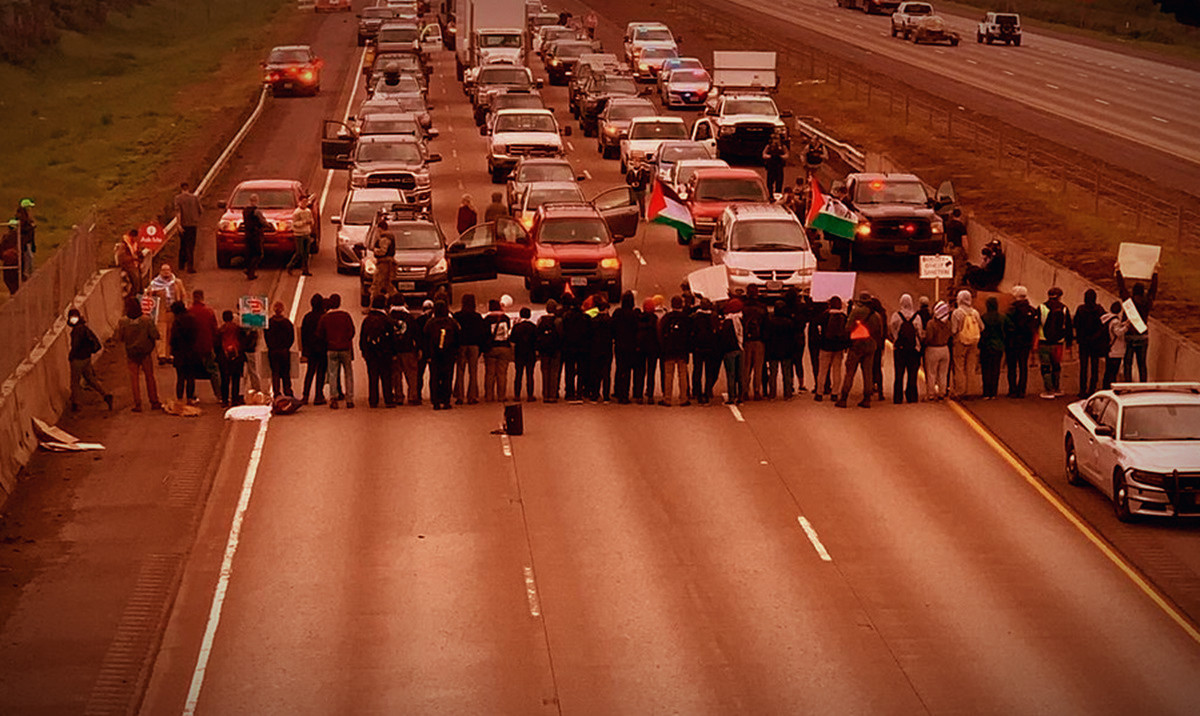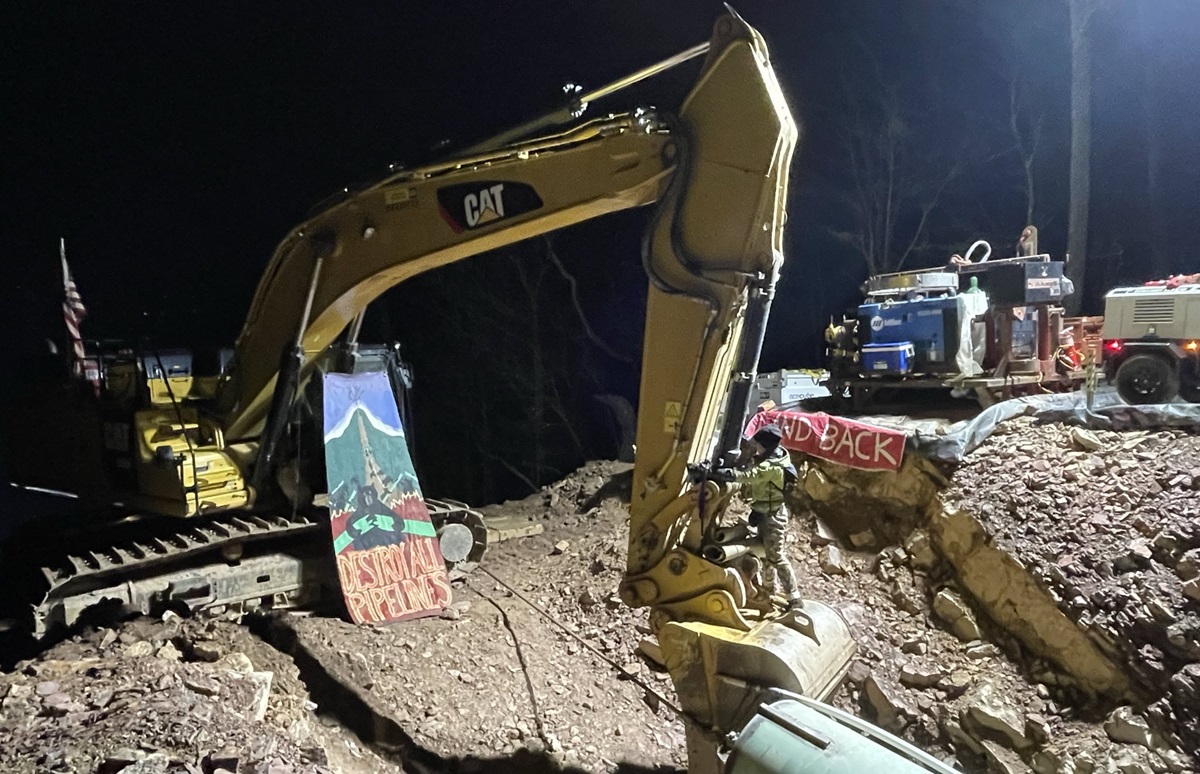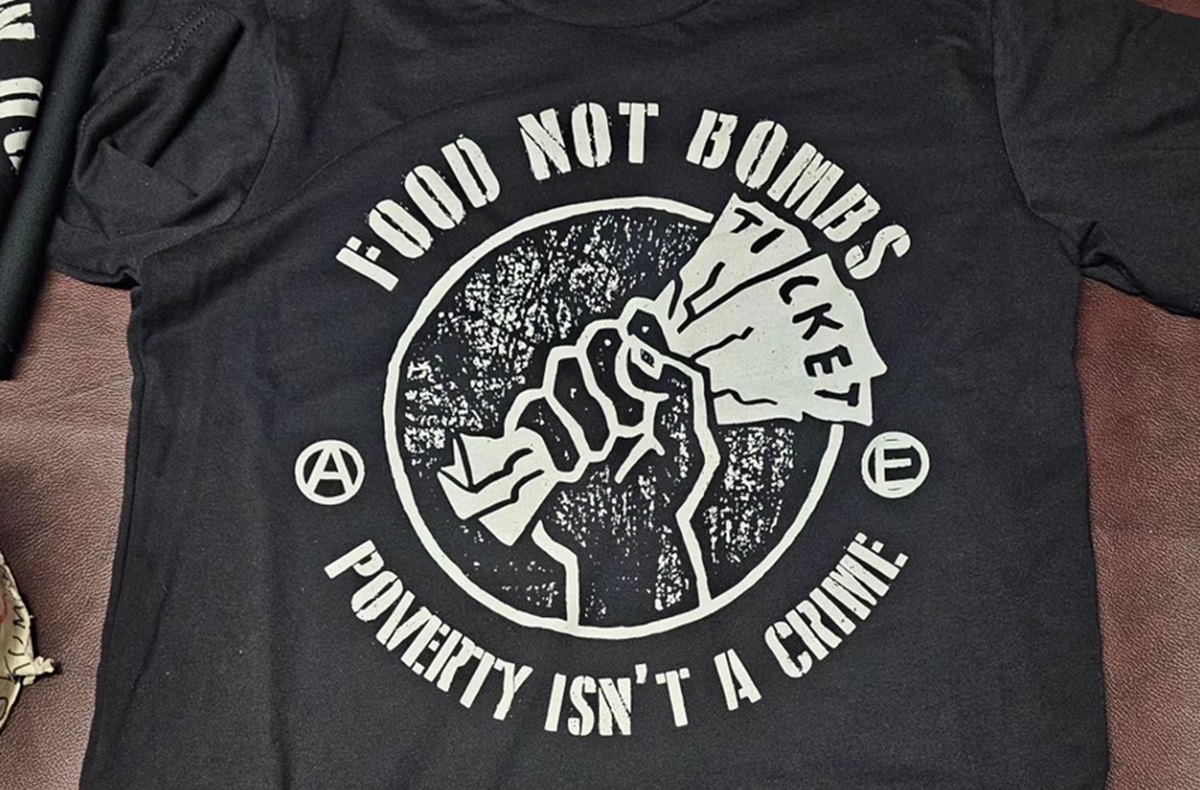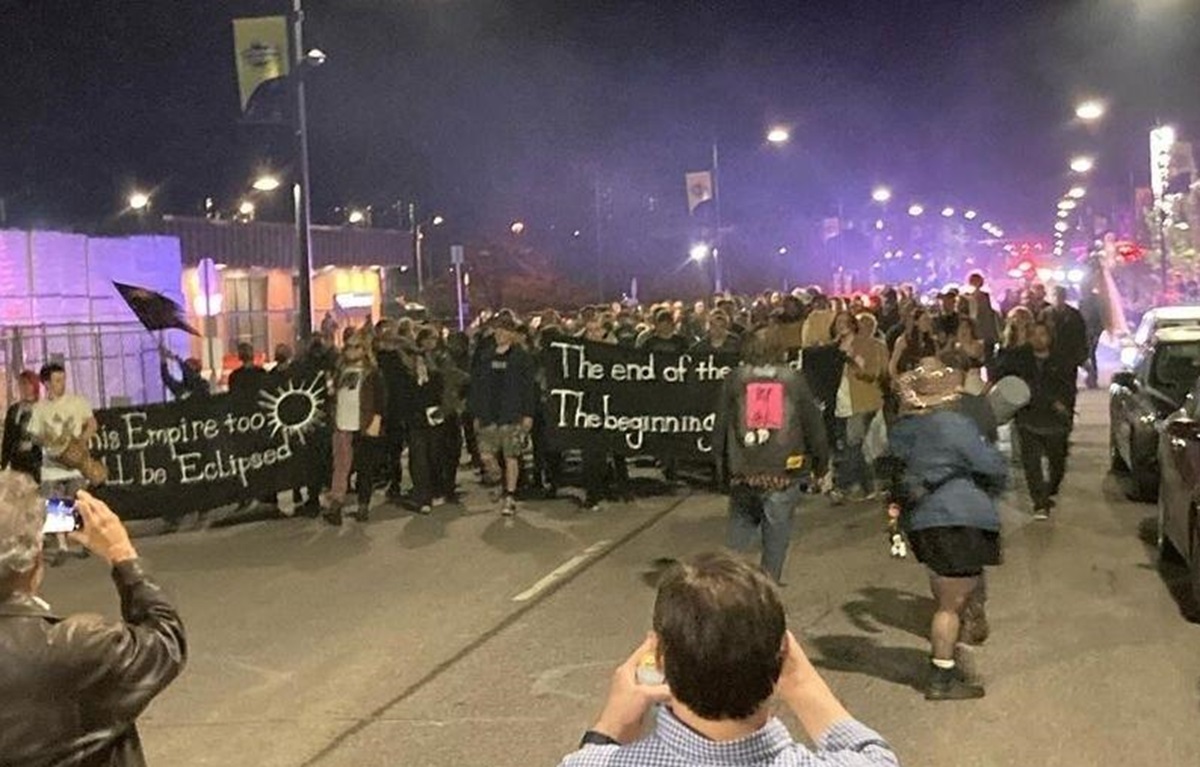Filed under: Analysis, Anarchist Movement, International Coverage, Repression, The State
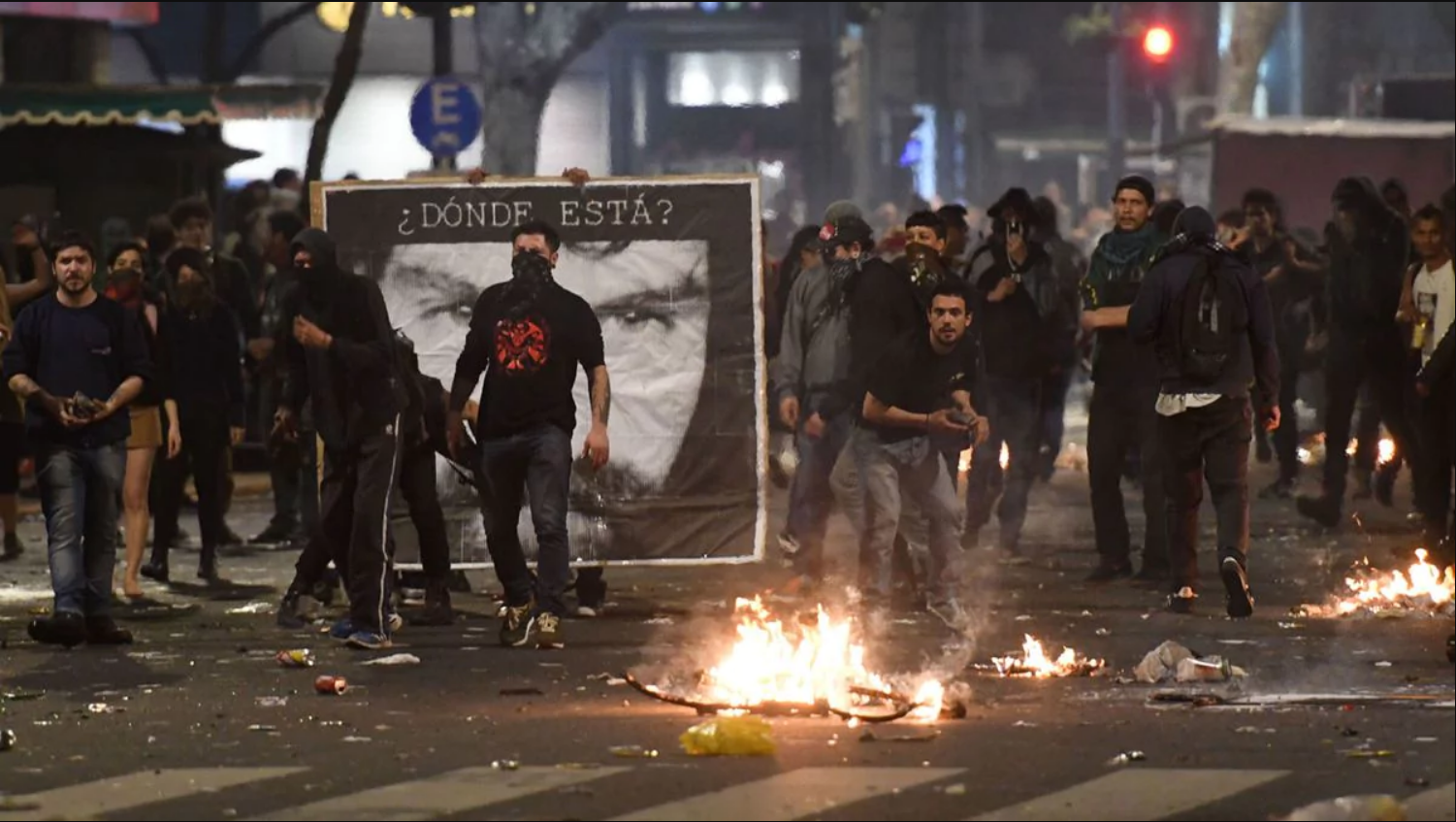
On August 1st, members of the Pu Lof Mapuche community in resistance in the Cushamen province barricaded National Route 40, along with allies in solidarity. They cut off traffic in solidarity against the legal proceedings confronting el Lonko Facundo Jones Huala (for the second time). Minutes later, buses and trucks arrived carrying about thirty border police armed with rifles. The Mapuches began throwing rocks, responding to the presence of the bastard forces of order. The border police advanced under the hail of rocks, burning the precarious houses and belongings of the Lof, forcing them to retreat across a river. Among them was Santiago Maldonado (“Lechuga” or “el Brujo”), who fell behind the rest. Some of the inhabitants of the Lof saw that the border cops grabbed Santiago; others testified as to hearing the police say they “got one.”
Afterwards, images and testimony began to circulate about how Santiago was missing, and that it seemed the border police had taken him away in a “unimog” all-terrain military vehicle. The authorities were silent through this whole process.
On Friday, August 4, various anarchists and individuals in solidarity entered the seat of government in Chubut province, demanding Santiago’s return. The place was ripe for destruction. Computers, notebooks, windows, and decorations were all angrily destroyed, and fliers and graffiti were left behind referring to the repression in Cushamen.
On Monday, August 7, a gathering was called in the Plaza del Congreso, bringing various organizations and groups together with Santiago’s family. The gathering ended up being quite large, and many comrades showed up. Enraged not only because of what had happened, but also because the political apparatus — getting ready for their elections — had been distributing fliers for their Leftist Front. On the same day, after the gathering, Entre Ríos street was cut off, and rocks, poles and firecrackers were thrown at the infantry, two city police and one National Congress guard who had been stationed nearby. Afterward, two police motorcycles were set ablaze. In the end, the group dispersed, without any arrests or injuries on our side.
On Friday, August 11, marches and actions were organized throughout various parts of the country: Bolsón, Bariloche, Rosario, and Buenos Aires. In the capital, human rights groups (including a section of the Madres de la Plaza de Mayo, the mothers of individuals disappeared during the period of dictatorship), gathered alongside family members and friends of Lechuga’s, with more leftist organizations bringing together a “peaceful” gathering in the Plaza de Mayo, in front of the Pink House, the seat of government. In front of the multitude, one of Lechuga’s brothers read some of his writing, making his anarchist and anti-police positions completely clear.
One of the things that makes us quite angry is the way these events have been used by political parties — the PO, the MST, the MAS socialist convergence, and Kirchnerist parties — as well as NGOs, and unions like the CGT, with its dark history during the Peronist period, involving the AAA and para-police groups. They use our comrade’s image alongside a partial story to gain a few more kernels of legitimacy in the middle of an election campaign. The kidnapping of Lechuga IS NOT A POLITICAL CAMPAIGN. These scavengers would never feel strange defending private property, the border police, or even the same governments that repress them and bury them in the misery of everyday life — because they themselves desire to obtain that same power, and exercise that same authority. We have absolutely nothing to do with them, or with their conciliatory responses to the kidnapping of our comrade.
On Thursday the 17th, a march was called in Córdoba Capital, where a great multitude demanded that Santiago be returned, alive and whole. The police deployed a massive riot-control apparatus. That same night, in the early morning, some anonymous individuals left a rudimentary device that burned the doors at the entrance to the Association of Non-commissioned Officers of the National Police in Córdoba. No one claimed responsibility. Days later, a national march against trigger-happy cops resulted in confrontations and destruction throughout the center of Córdoba. Later, various anarchist, platformist, and political spaces were raided, including a dining hall, as well as the homes of mothers whose children were murdered by the police. They took only posters, flags, and fliers that had to do with Santiago’s case (as well as the milk from the dining hall). A few people were detained, but they were released after a few hours.
On Thursday the 24th, the group H.I.J.O.S. (made up of children of the disappeared) and leftist groups called for a gathering and march in the Plaza San Martín in La Plata. Quite a few people attended, including a black bloc of anarchists. During the march, there was some damage done in the central streets of the city. The march ended in the same plaza where it had begun, across the street from the Buenos Aires Senate. Under the astonished gaze of several indignant citizens, the street was blocked, an expensive truck was destroyed, and the senate was attacked with rocks and a couple Molotov cocktails, resulting in some destruction and burning the facade of the building. Two hours later, two individuals left large cans filled with gasoline, burning two cars in the senate parking lot. No one claimed responsibility for the attack. Several days later, the intelligence chief of the Buenos Aires police was fired.
In some of these demonstrations and marches, as well as in the streets and universities, and above all on social networks, we see that a large part of public opinion has empathized with and become “aware” of Santiago, and a smaller part has supported violent actions. It is true that in Argentina, to speak of forced disappearances is to speak of the military dictatorship and of memories that have been engraved in the social consciousness. The vast majority of politicians try to hide the continuation of the repressive apparatus — hide the similarities between the dictatorship and the current democratic government. Repression, torture, and forced disappearances never really ended…
We believe it is necessary to expand the conflict. From the first moments, comrades and allies creatively demonstrated around the world, first in Uruguay, Chile, Bolivia, and Peru, and then in the U.S., Spain, India, France, Syria, Colombia, Mexico, and many other corners of this worn-out planet. These demonstrations have spread not only the news of what happened to Lechuga, but the fact that solidarity must be internationalist and without borders other than the limits that we set for ourselves.
The press takes aim, and the state pulls the trigger.
What to say about the news articles and journalistic investigations by mercenaries like Jorge Lanata, Mauro Viale, Eduardo Feinmann, and other information lackeys in the press? They put forward the name of the Mapuche Ancestral Resistance (RAM, a separatist guerrilla group), crediting them with more than thirty actions from one day to the next, from flyering to the burning of ranches, the death of a border policeman in San Martin de los Andes, and the sale of weapons and drugs. They pass along images of possible Santiago Maldonados in Mendoza, Entre Rios, and Buenos Aires; they put together theories that Santiago was a hostage of the Mapuches, that he had died in an attack on a ranch, that he was never in the Lof, or that he was a simple artisan or traveling hippie.
After the attack on the seat of government in Chubut, the press attributed the attack to a RAM cell, stating that the attack “alarmingly” took place two blocks from the obelisk, and that they went in shooting; but if we look at the place for two seconds through the photos that were released, we can see clearly that there were several circle-A signs painted up, and that the damage was not done by bullets. Their exaggerations really are limitless…
The state needs to vindicate its own authority – it needs to create internal enemies. The unemployment and economic crisises have resulted in an emergent malaise that can be felt clearly in the streets; what could be better than blaming the economic collapse on non-Argentinian students, like Jorge Lanata’s news program argued? Or blaming the destruction of the formal economy on Africans selling counterfeit goods, like the América 24 news channel tried to do? Or President Mauricio Macri saying that the workers have to stop messing around with all of this blocking of roads, to stop passing judgement on the bosses — because this discourages foreign investment?
Statements from Patricia Bullrich (the Minister of National Security) say that she won’t allow the border police to be crucified (“…I’m not going to throw the border police under the bus…”), claiming that the Maldonado case is not a forced disappearance, and declaring through clenched teeth that she thinks it’s impossible that thirty border police would conspire to kill and disappear someone. As she says, this police force is not the same as it was 40 years ago, always playing the same game of “bad dictatorship, good democracy.”
The Bullrich family has always known how to defend their ideological and economic interests. Adolfo Bullrich headed a business that auctioned land off after the disastrous Desert Campaign — a campaign pushed forward by then-president Avellanada and continued by Julio A. Roca, the goal of which was to annihilate the native peoples who lived there, seize immense land holdings, reaffirm national sovereignty, and generate juicy business contracts with English and Welsh companies, as well as whoever wanted to invest. Esteban Bullrich, Patricia’s brother, left his post as minister of education in order to stand for election. In an election ad, Esteban spoke of the positive changes that the Cambiemos government had generated during those months, stating “We have put more kids in school, more pavement on the streets, and more young men in prison…” Are these words surprising, coming from someone who in 2005 defended the repressive murderer Luis Patti so that he could take a position in congress? He did declare that in a democracy, there is space for debate between different ideologies…
After the proposal for a week of action for Santiago went out over the internet, state security forces were put on alert — so much so that a senior official in the intelligence department of the federal police sent a document to the governor of the province of Buenos Aires, María Eugenia Vidal (of the center-right PRO party) ordering an increase in security and patrols in the streets. The document described possible attacks against individuals belonging to the security forces, infrastructure, and buildings. The result was not only a visible increase in the number of police (in plazas, border police buildings, train stations, police precincts, and troubled neighborhoods), but that they brought out the shiny toys that we hadn’t seen for a long while: Federal Police armored vehicles, water cannon trucks, and troop transport vehicles all over the place. Everything but the army in the streets.
This new escalation of repression that has been taking place — and will continue — in the streets of the Capital, demonstrates that the ministry of security, as well as the bosses of police “intelligence” intend to restrict all solidarity, rage, and the actions that were unleashed following Santiago’s disappearance. Perhaps these sparks can bring us to break new limits…
In some of our spaces, their harassment is plainly visible. Now it’s not just phone taps and cops following some comrades home, but investigative teams taking pictures, infantry trucks on the corner, and patrols coming and going.
All of this responds to a specific context. In some neighborhoods of the province of Buenos Aires, police have been stopping members of collectives to ask for their documents and check their belongings; the notable increase in patrols and police officers is not just an effort at control and surveillance, but also at the same time, an attempt to clean up the terrible image of both the border police and the cops. During Children’s Day, border police brought trucks of toys (made in the image of their vehicles) to different schools and cafeterias — that is to say, they shamelessly repeated slogans of “solidarity” in the same places where they perform intelligence work, go in shooting, and carry out fierce repression. If their intelligence work was designed under the framework of Project X in the Kirchner epoch, when they built a database by closely following social activists and organizations, now they’ve come out onto the field of play more than ever before, becoming one more shock force that the State can employ in its favor.
Of course, the law follows not far behind, not only with the reform to law 24.660 (which removes almost all prison benefits and temporary releases, giving more decisive power to the Penal Service), but also increases in sentences, broadening legal definitions of illicit association, weapons possession, and damage to private property.
Relations between Mapuches and anarchists
We have seen that in the last couple years, some Mapuche communities have been leaving aside legalistic angles of struggle, and have decided to occupy the properties of large landholders and portions of state land. Machines have been burned, there have been coordinated attacks on various positions on single ranches — similar to what is going on in the Wallmapu on the Chilean side.
The media have taken it upon themselves to declare that all Mapuches belong to RAM, or that the Mapuches who live in the Lof belong to RAM, generating a perfect internal enemy. In reality, RAM (Mapuche Ancestral Resistance) is nothing more than the abbreviation with which some Mapuches claim their actions in the Wallmapu in the Argentine region.
El Lonko Facundo Jones Huala is recognized as belonging to this Mapuche group. At the moment, he is detained in the prison at Esquel, where he spent 18 days on hunger strike, awaiting a presumed extradition to Chile. He has recognized the occurrence of a historic confrontation not only with the Argentine state, but the Chilean state as well, along with the corporations that have devastated indigenous territories without fear of reprisal, with the excuse of “progress.” This is an ancestral struggle that has lasted more than 500 years. RAM is only a small expression of this long struggle.
The harassment and constant persecution not only by the forces of order, but also by the business owners and the media is disgusting. They try to justify both repression and the advance of neocolonialism. They throw out headlines alleging that the Mapuches are connected to the FARC, that they have military assault weapons, that they are “fake indians,” and many other idiocies.
For us as anarchists, it’s impossible not to be angry with the ways that the state harasses, attacks, and disappears the Mapuche, as well as the Qom, the Wichi, or the Guaraní, not to mention the tribes living in the Amazon, who resist the advance of the machines and “human progress” understood as civilization.
We share much with the Mapuches who are fighting in the south of the region, but there is also a chasm distancing us from them. Their forms of organization and the relationships that they have developed, involving themselves with nature and the land are a demonstration of their own, specific cosmovision. As anarchists, we recoil from their desire to advance and obtain their own Mapuche nation. We respect their rebel dignity, and will stand in solidarity, but we do not share in the totality of their struggle.
NO DEMANDS ON THE STATE; PERMANENT CONFLICT AGAINST AUTHORITY
We all desire that our comrade be returned alive, that he may follow whatever path he desires. We know that the state is responsible for this disappearance, because that is one its functions: the persecution and “extermination” of “disturbing elements” that disrupt the normal functioning of society. For the same reason, we cannot demand anything of our persecutors. They are responsible for the disappearances from trafficking, the connections between the narcos and the police, the executions of youth in our neighborhoods at the hands of the cops, the approval of laws increasing sentences, playing with the lives of prisoners, responsible for the application of new technologies for social control, for the destruction of natural territories in order to put up concrete walls and plantations of soy or GMO corn – everything that turns the wheels of capitalist progress.
We feel that they have tried to depoliticize our comrade. They have attempted to deny his anarchist convictions, and they have tried to hold him up as a slogan for one more political campaign. On one hand, Cristina Kirchner and her bootlickers seem to have very short memories: They talk about Santiago, but they evaporate when we bring up Julio López. Although Hebe de Bonafinni (one of the founders of the Madres de la Plaza de Mayo) might have said that López was a jailer and that Santiago was a social activist, she said it to defend Kirchenerism. And what’s more, it’s a lie – López was a carpenter and was disappeared in 2006 because he was going to testify against Miguel Osvaldo Etchecolatz, a leader of the forces of repression during the dictatorship. López’ disappearance demonstrates that even after 15 years, the military still has plenty of power. Nor do they want to talk about Luciano Arruga — a youth from the marginal neighborhood Lomas de Mirador, who was kidnapped, murdered, and buried as a John Doe in the la Chacarita cemetery, because he refused to steal for the police. Nor do they want to remember Cristian Ibáñez, who was detained by the police only to later appear to have “killed himself” in his cell in a police precinct in Jujuy, or Marcelo Cuellar, who was murdered in the town of Libertador General San Martín in 2003, at a march following Ibáñez’ murder — both were militants with the Combative Classist Current. They don’t want to talk about Carlos Fuentealba, killed by police repression in Neuquén during a workers’ blockade of Route 22 in 2007, or Juan Carlos Erazo, killed in Mendoza in 2008 following a brain abscess resulting from an injury when he was hit by a rubber bullet and tear gas during a factory takeover where he worked. They want to forget that on June 17, 2010, Diego Bonefoi was murdered by police in Bariloche, shot in the back of the head. On the next day, the neighborhood organized a protest, and two more youths were killed in the resulting police repression: Nicolás Carrasco and Sergio Cárdenas. On October 20 of the same year, Mariano Ferreyra – a militant in the Workers’ Party — was shot twice and killed by strikebreakers from the Railway Union, during a protest organized by workers whose jobs at Roca Railways in Avellanada had been outsourced. During the Kirchner era, indigenous peoples have suffered the same fate. The indigenous community member Javier Chocobar, part of a Diaguita community in Tucumán, was resisting displacement alongside other members of the community. On October 12, 2009, a former cop working for the landowners drove in and started shooting, killing Javier and injuring other inhabitants of the community. On November 23, 2010, in Formosa, some indigenous Qom members of the community La Primavera blocked a road to reclaim their lands. The police repressed them violently, murdering two members of the community, Sixto Gómez and Roberto López.
This has not only taken place under Kirchenerism. All governments are of one color, and have dozens of repressive murders on their hands. Further back there is Víctor Choque, Teresa Rodríguez, Mauro Ojeda, Francisco Escobar, Aníbal Verón, Carlos Santillán, Oscar Barrios, the youths Maximiliano Tasca, Cristian Gómez, Adrián Matassa, Miguel Bro, Javier Barrionuevo, Petete Almirón, Dario Santillán and Maximiliano Kosteki, and so many more who have been beaten, tortured, disappeared, and murdered by the forces of order — in neighborhoods, in police precincts, in psychiatric hospitals, in brothels and jails.
Their hands are bloody — soaked with the blood of the marginalized, the blood of illegals, the blood of rebels. Passivity is not an option: It’s time to demand vengeance. Vengeance against the executioners, and vengeance for the life of misery they have imposed. Vengeance for their constant violence. There has never been peace, with so many dead, and we know who is responsible. We know their names, their titles, and their intentions. They try to call us infiltrators, to call us violent, and we reply:
WE CAN STILL BE WORSE.
Some anarchists in Buenos Aires, September 2017.


